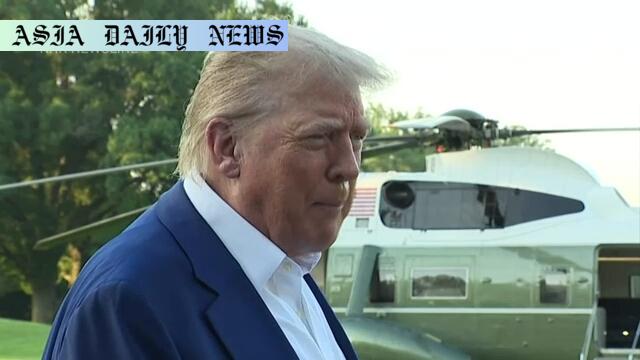Ceasefire: Trump criticizes both Israel and Iran for violating the recent ceasefire agreement amidst escalating retaliatory actions.
- Ceasefire violations spark sharp criticism from President Trump toward both Israel and Iran.
- Trump urges Israel to de-escalate military actions and strongly criticizes their retaliatory moves.
- Iran denies accusations of missile launches towards Israel amid conflicting reports.

Trump Accuses Israel and Iran of Ceasefire Violations
On Tuesday, President Donald Trump harshly criticized both Israel and Iran over their alleged violations of a ceasefire agreement aimed at alleviating escalating tensions in the region. Trump, during an interaction with reporters, expressed his dissatisfaction with Israel’s actions, stating, “I didn’t like the fact that Israel unloaded right after we made the deal.” He further emphasized that Israel’s retaliation against alleged Iranian missile provocations went too far, adding, “We have to have Israel calm down.” In a bold stance, the president conveyed a strong warning to Israel on his social media platform, urging the nation to halt military strikes and “bring your pilots home.”
The controversy began when Iran was accused of launching missiles toward Israel—a claim Iran’s state-run media later denied. Meanwhile, the Israeli Defense Ministry revealed that Defense Minister Israel Katz had ordered military action in response to these provocations, highlighting the fragility and volatility of the truce. Though the conflicting accounts from both nations muddle the full picture, the breakdown jeopardizes the fragile peace in the region.
Analyzing Trump’s Firm Stance
President Trump’s public condemnation of both Israel and Iran is significant given the traditionally strong alliance between the U.S. and Israel. His remarks might indicate a shift toward a more critical stance, particularly regarding actions that could exacerbate instability in the region. Trump labeled Iran’s alleged actions as unacceptable but reserved stronger objections for Israel, showcasing a balanced approach to holding both parties accountable for preserving the fragile grasp on peace.
Furthermore, while Trump’s strong rhetoric reflects frustrations over ceasefire breaches, it also underscores the difficulties in managing alliances and maintaining diplomatic credibility. The ceasefire arrangement was seen as an attempt to de-escalate tensions amid rising hostilities. Trump’s criticisms add another layer of complexity to an already precarious situation, potentially influencing how Israel and Iran proceed moving forward. His directive for Israel to halt bombings may have far-reaching consequences, especially within U.S.-Israel relations.
The Broader Implications of Ceasefire Violations
The current situation exemplifies how ceasefires, though promising on paper, are often difficult to maintain in areas of entrenched hostilities. This development serves as a reminder of the challenges faced by global leaders attempting to broker lasting peace agreements. For Israel and Iran, the heightened tensions question the plausibility of reaching any sustainable accord, especially when mutual trust remains virtually nonexistent.
The international community will undoubtedly be watching closely, as further escalations in the region could spur broader geopolitical repercussions. The U.S.’s role is also likely to be scrutinized, especially as Trump balances the tightrope of protecting American interests without showing favoritism in the face of ceasefire violations. The situation once again underscores how fragile geopolitical stability can be.



Commentary
Trump’s Approach: A Bold Call for Responsibility
President Trump’s remarks regarding the alleged violations of the ceasefire by Israel and Iran signal a rare moment of impartiality in his rhetoric. Traditionally staunch in his support for Israel, Trump’s criticism reveals the gravity of his dissatisfaction with military escalations that threaten the fragile truce. His plea for Israel to restrain its military response is as pragmatic as it is unexpected, showing a keen awareness of the potential for escalation that could entangle the U.S. in further conflicts. For many observers, this shift may signify a nuanced effort to hold allies accountable for their actions.
Balancing Alliances Amid Rising Tensions
The dynamics between Israel, Iran, and the U.S. have long been marked by shifting allegations and strategic calculations. By calling out both Israel and Iran, Trump places himself in a challenging position—a mediator of sorts in an already convoluted geopolitical landscape. His warnings to Israel to dial back its retaliatory strikes reflect the high stakes involved in preserving the optics of fairness on the world stage, particularly when addressing sensitive ally relationships. However, such actions demand diplomacy, tact, and an astute understanding of the underlying tensions, lest they strain ties further rather than promote de-escalation.
Ceasefires and the Challenge of Sustainable Peace
Ceasefire agreements are an enduring symbol of hope in the face of conflict, yet the latest developments in the Israel-Iran conflict underline the delicate nature of these accords. Violations, whether perceived or real, erode the trust necessary to sustain peace efforts. Trump’s vocal intervention is a reminder that sustaining a ceasefire requires more than agreements on paper—it demands accountability and a genuine commitment to de-escalation. This episode also emphasizes the importance of international oversight in conflict zones, as unchecked retaliations can quickly erode hard-won progress.
In conclusion, while Trump’s critique demonstrates his resolve for peace, it also raises questions about whether such rhetoric will lead to tangible outcomes. Both Israel and Iran must now navigate a more fragile international landscape, where actions will be scrutinized not only by their adversaries but also by their allies. The road to sustainable peace is fraught with challenges, but addressing violations decisively and evenhandedly is a pivotal step forward.